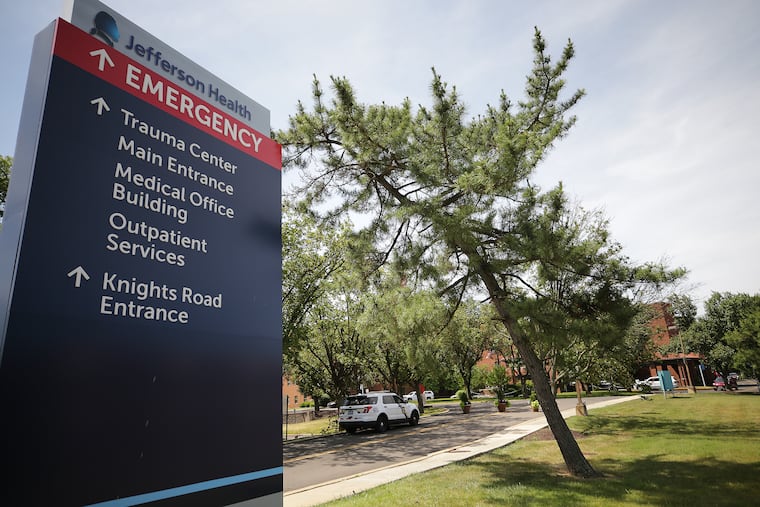Lawsuit accuses Jefferson Health of trying to block outside oncologists
Five Alliance Cancer Specialists oncologists who stand to lose their privileges at the Jefferson hospitals are asking a judge to block Thomas Jefferson University's decision.

A federal judge is weighing whether to temporarily block Thomas Jefferson University from revoking the ability of five oncologists working outside of its system to admit and treat patients at Jefferson’s Frankford, Torresdale, and Bucks County Hospitals.
During a four-hour court session Wednesday, a lawyer for the Alliance Cancer Specialists oncologists who stand to lose their privileges told U.S. District Judge Kai N. Scott that Jefferson’s decision to exclusively use its own Sidney Kimmel Cancer Center oncologists at those hospitals violates federal antitrust law and Pennsylvania contract law.
“It’s all about money,” said Matthew J. Modafferi, the lawyer for the doctors, who works in the New York office of Frier Levitt.
Jefferson, however, says the decision to use its own cancer doctors was part of an effort to maintain the best care for patients.
The Alliance Cancer doctors are asking the court to block Jefferson’s action, due to take effect Saturday. Scott said she expects to make a preliminary ruling Friday.
» READ MORE: What do you think about our Eds and Meds content? Please share your thoughts in this brief survey.
Allen Terzian, president of Alliance Cancer Specialists and founder of the cancer program at Torresdale Hospital, testified that losing privileges at Torresdale — where most of his patients go — would effectively put him out of business.
“I don’t know how to practice oncology without hospital privileges,” he said in court.
Jefferson says it is offering the Alliance doctors limited access to the hospitals as specialists in internal medicine.
The business backdrop
Jefferson acquired the three hospitals in question, which had been owned by Aria until 2016. That was part of Jefferson’s expansion from three hospitals to 18 from 2015 through 2021 under former CEO Stephen K. Klasko. After losing money through the pandemic, Jefferson is now trying to find ways to make its collection of hospitals work financially.
One way large health systems can bolster their bottom lines: Keeping cancer patients in house, instead of allowing emergency room doctors and other doctors to refer them to outside groups like Alliance Cancer.
Alliance has at least five affiliated practices, with a total of 36 oncologists. It is the largest oncology group in Southeastern Pennsylvania not employed by a health system. Alliance is part of US Oncology Network, a national management company owned by McKesson Corp., a distributor of pharmaceuticals. McKesson’s business includes chemotherapy infusions and other drugs used in cancer treatment.
Most of the Alliance doctors have privileges at other community hospitals in the region, including Nazareth, Grand View, Doylestown, Holy Redeemer, Chestnut Hill, Riddle and Crozer-Chester, that Jefferson does not own.
In cancer care, independent doctors and health systems fiercely compete for infusion business.
What the judge has to decide
In deciding whether to grant the temporary restraining order, Scott has to decide whether Alliance will suffer irreparable harm and how likely it is that Alliance would ultimately prevail in its legal case.
Terzian testified that without privileges at Torresdale, the hospital central to the community it serves, his division of Alliance won’t be able to hire new oncologists.
One of his colleagues, Anjana Ranganathan, said she was worried that primary care doctors would no longer refer patients to her if she didn’t have oncology privileges at the Jefferson hospitals. This could hurt her reputation and her patients’ care, because she won’t be able to fully attend to their needs when they are hospitalized.
“I can’t be swayed by things that seem sympathetic,” Scott said after hearing from Alliance doctors about the feared impact on their practices and patients. “I have to make a legal decision.”
Alliance also is asking Scott to find that Jefferson’s behavior is anticompetitive and violates antitrust laws. On this point, the judge noted too little information was provided about each system’s market share.
Jefferson has experience fighting antitrust allegations. During a trial in 2020, the Federal Trade Commission failed to prove its allegations that Jefferson’s acquisition of Einstein Healthcare Network was anticompetitive and needed to be blocked. The federal judge ruled that eliminating Einstein as an independent organization would not hurt competition because the region has so many health systems.
William L. Roberts, a lawyer representing Jefferson, criticized Alliance’s limited definition of the geographic market in question.
He argued Alliance was ignoring other competitors in cancer care, such as Fox Chase Cancer Center, St. Mary Medical Center, and Nazareth Hospital.
“It’s too narrow to look at ACS’ market alone,” said Roberts, who is based in Ropes & Gray LLP’s Boston office.